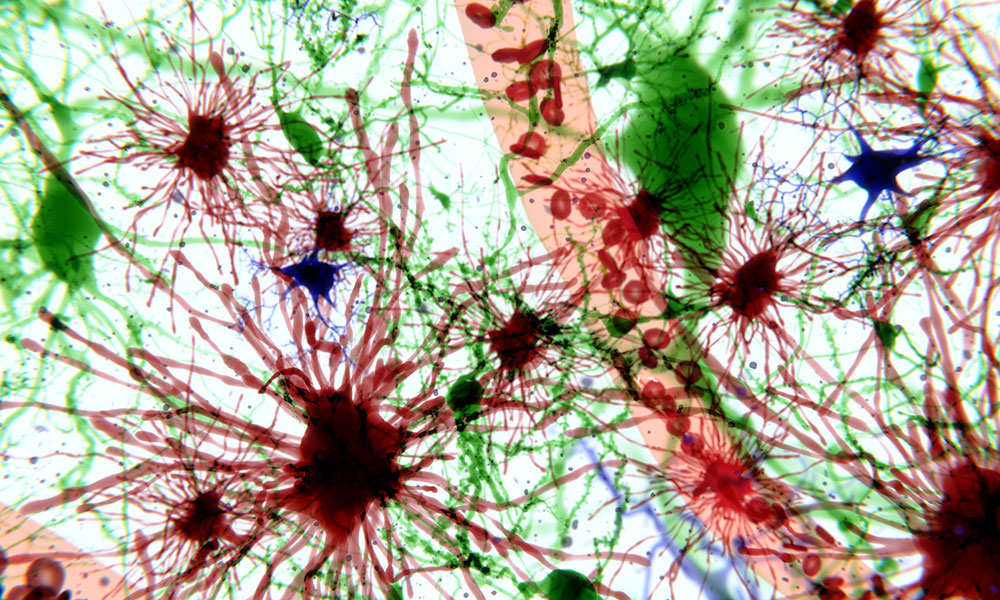
Star-shaped astrocytes, shown red in this image, extend cellular projections like tentacles to communicate with neighbouring brain cells. Once astrocytes become cancerous, the projections become longer, and their networks become more complex, invading different areas of the brain.
Brain cancer. It’s the diagnosis no one wants to hear.
Patients with high-grade gliomas, or tumours in the brain and spinal cord, have an average life expectancy of a mere 12 to 16 months. Not only do tumours in the brain spread more aggressively than in other tissues, but these tumours are also resistant to chemotherapy and have a high probability to recur after surgical removal.
Now UBC Okanagan researchers are working to better understand the development and rapid growth of cancerous cells in the brain.
Sessional Lecturer Dr. Mitra Tabatabaee and Dr. Fred Menard, Associate Professor in Chemistry, Biochemistry and Molecular Biology at UBCO, examined astrocytoma, a cancer that begins in astrocytes—cells that support nerve cells.
Currently, astrocytoma is highly fatal with no effective treatment.
Their research, recently published in Cells, reviews the potential role of an imbalance of glutamate—a neurotransmitter that stimulates nerve cells—in astrocytoma progression. It suggests that several receptors not previously considered in brain cancer research might be crucial to the cancerous growth of astrocytoma.
“Astrocytoma spreads throughout the brain quickly, and there is no treatment,” says Dr. Tabatabaee. “There’s not enough information about the development of astrocytoma, which is one of the main reasons for the lack of effective treatment. We need to know first the molecular mechanism of what’s happening.”
Star-shaped astrocytes extend cellular projections like tentacles that stretch to communicate with their neighbouring cells. Once these astrocytes become cancerous, the projections become longer, and their networks become more complex, invading different areas of the brain. How far they extend in the brain is strongly correlated with the cancer’s aggressivity and its resistance to treatment.
“If some extra-long cell projections are left behind during surgery, the tumour can grow back,” says Dr. Tabatabaee.
A suspected cause of this uncontrolled growth of cellular processes is elevated levels of glutamate. When astrocytes sense glutamate, the concentration of calcium rises inside the cell. Since calcium is also necessary for growing cellular projections, the glutamate receptors that affect the calcium inside astrocytes are prime suspects for the abnormal growth of astrocytoma cells.
By studying astrocytoma cells, Dr. Tabatabaee and Dr. Menard identified a glutamate receptor and two other molecular contributors crucial in extending the projections of these cancerous cells.
With further study, researchers believe that these overlooked receptors can serve as targets for designing more effective chemotherapies and open up new avenues to halt the progression of this aggressive and often fatal cancer.
“Studying and targeting these specific receptors, may pave the way to understand how we can stop infiltration of the disease throughout the brain and prevent the tumour growth,” says Dr. Tabatabaee.